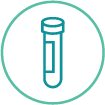Pharmacogenomic Research Analysis for Laboratories
Coriell Life Sciences (CLS) provides general-purpose research services. As such, it has worked for over 10 years to curate published literature, consortium evidence, standards organization findings, and other reference information to provide users with relevant medical reference information related to pharmacogenomic variations. CLS analyses are intended for educational and research purposes only. Working with CLS enables laboratories to improve lives, reduce costs, and increase revenue by:

Expanding testing expertise

Differentiating from other commercial laboratories

Growing their businesses

Shared Mission
CLS’ convenient turnkey PGx research analysis solutions for laboratories increase the effectiveness and importance of testing while reducing waste. Measurable results for laboratories include:
- New strategies for business growth with broadened service offerings
- Increased revenue from current capital equipment
- Simplified decision-making by providing research analysis from multiple sources for you in one place
PGx Research Analysis Portfolio
Robust pharmacogenomic reporting algorithms empower laboratories with comprehensive and flexible product offerings to expand services.
Pharmacogenomic (PGx) Research Analysis Services
CLS delivers research analysis of clinical laboratory pharmacogenomic results. CLS’ PGx reports evaluate genetics in concert with other medication-associated risks to improve patient health to provide a complete, personalized picture of medication safety.
All CLS guidance is transparent and cited with the published literature references available for independent review. The CLS literature research analysis also makes clear that the state of knowledge in pharmacogenomics is not fixed. New literature that refines previously published guidance, or provides wholly new guidance, is published continually. Researchers and other users who utilize PGx reference information, including any meta-analysis information generated by CLS, should do so with the full knowledge of these limitations.
- GeneDose: Comprehensive Polypharmacy Interpretation and Reporting —Borne from the personalized medicine research study at the Coriell Institute for Medical Research where the landmark, peer-reviewed PhAESIS process1 for evidence evaluation was created, Coriell Life Sciences’ GeneDose PGx report provides comprehensive, clinically-relevant, and scientifically-rigorous results for pharmacogenomic and medication safety reporting.
- CLS performs a meta-analysis of the available research literature using a process of evidence assessment that has been published and peer-reviewed. The ultimate findings of that meta-analysis are presented for consideration as the professional opinion of the CLS research team.
- Laboratories and other users may opt to engage with CLS to create a research analysis of specific gene variations. The variations are aligned to the meta-analysis results for each gene:drug pairing. The resulting research analysis is distinct from the CLIA reporting of genetic variations from the laboratory. It exists as a 3rd party literature review from professional researchers. The analysis is not intended to provide clinical reporting, but rather to quickly surface relevant medical reference information that may be educational for its users.
- ADHD Medication Appropriateness Reporting—Recommendations for, and against, specific ADHD medications based on the patient’s DNA.
- Cardiology Medication Appropriateness Reporting—Comprehensive analysis of risks associated with polypharmacy in the cardiac patient include drug-drug interactions, anticholinergic burden, age- and pregnancy-related concerns, FDA warnings, food and drink interactions, and genetics.
- Behavioral Health Medication Appropriateness Reporting—Based on an individual’s pharmacogenomics profile, this report provides details for the treatment of depression, anxiety, ADHD, and other psychiatric health concerns.
Grow—and expand—your laboratory testing services with these additional PGx reports from CLS:
Opioid Appropriateness and Pain Treatment Reporting—Addressing clinical pain management, CLS tackles medication safety, efficacy, and Opioid Use Disorder predilection in an actionable report that consists of:
- Analgesic Appropriateness Report—Determines the most appropriate pain medication based on an individual’s DNA.
- Coriell Life Sciences Addiction Predilection (CAP) score—A quantitative measure of a patient’s likelihood of developing Opioid Use Disorder.
Malignant Hyperthermia (MH)—Details the diagnosis and lists medications to avoid. Available alone or as part of the Perioperative Medication Appropriateness Report.
Cannabinoid Receptor Report—Records results from certain CNR1 & 2 gene SNP variants. No clinically-relevant outcomes based on interpretations provided.
Perioperative Medication Appropriateness Report
- Malignant Hyperthermia (MH)—Details the diagnosis and lists medications to avoid.
- Pain Management—Details medication appropriateness, including predilection for Opioid Use Disorder.
- Post-Operative Nausea and Vomiting—Provides class- and therapeutic-specific medication appropriateness and recommendations.
Infectious Disease Molecular Diagnostics Reports:
CLS delivers actionable pharmacogenomic research analysis of clinical laboratory infectious disease and antibiotic resistance testing. The CLS Infectious Disease Report interprets semi-quantitative laboratory assays of pathogenic microorganisms and, in concert with antibiotic resistance testing, provides antibiotic treatment options.
- Women’s Health Interpretation and Reporting—The comprehensive Women’s Health Report provides differential diagnoses of Bacterial Vaginosis (BV), Yeast Infection, and Trichomoniasis (Trich) Infections with increased specificity and sensitivity2,3. Treatment options based on diagnosis, history of recurrence, and pregnancy status are included to assist in rapid prescription decision making. This report can also include Aerobic Vaginitis (AV) and Sexually Transmitted Infections (STIs).
- Gastrointestinal Infection (GI) Testing—Our comprehensive GI Infection Report identifies and analyzes enteric pathogens responsible for gastrointestinal infections, including viruses, bacteria, and parasites. The report provides actionable insights for treatment options based on the type of infection and antibiotic resistance profiles. This service aims to enhance diagnostic accuracy and support effective therapeutic decision-making for conditions such as gastroenteritis, food poisoning, and other GI-related ailments.
- Urinary Tract Infection (UTI) Reporting—Provides identification of pathogenic organisms to guide rapid therapeutic decisions.
- Respiratory Pathogen Panel (RPP) Testing—Diagnoses multiple respiratory ailments including SARS, pneumonia, and TB from a single sample.
- Soft Tissue Wound Healing (STWH) Reporting—Evaluates and provides insights on hard-to-manage wounds prevalent among elderly and diabetic patients.
- Fungal Testing—Identifies a variety of dermatological and systemic fungal infections.
- Sexually Transmitted Infections (STI) Reporting—Provides detailed infection confirmation to guide rapid therapeutic decisions.
1 The Coriell Personalized Medicine Collaborative Pharmacogenomics Appraisal, Evidence Scoring and Interpretation System, Genome Medicine, October 2013. Gharani, N; Keller, MA; Stack, CB; Hodges, LM; Schmidlen, TJ; Lynch, DE; Gordon, ES; Christman, MF.
2 Diagnosing Bacterial Vaginosis with a Novel, Clinically-Actionable Molecular Diagnostic Tool. J Appl Microb Res. Vol: 1, Issue: 2 (01-08). Jarvis JP, Rains D, Kradel SJ, Elliott J, Diamond EE, Avaniss-Aghajani E, Yasharpour F, Shaman JA (2018)
Interested in expanding your laboratory capabilities through pharmacogenomics? Call (888) 415-7834 or complete this form to explore your opportunities.